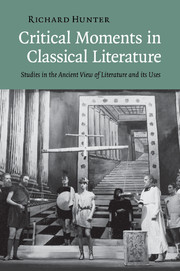Book contents
- Frontmatter
- Contents
- Acknowledgements
- List of abbreviations
- Introduction
- 1 Aristophanes' Frogs and the critical tradition
- 2 Readings of Homer: Euripides' Cyclops
- 3 Comic moments
- 4 The ugly peasant and the naked virgins: Dionysius of Halicarnassus, On Imitation
- 5 The grand and the less grand: ‘Longinus’, On the Sublime
- 6 Reading for life: Plutarch, ‘How the young man should study poetry’
- Bibliography
- Index of passages discussed
- General index
3 - Comic moments
Published online by Cambridge University Press: 03 May 2010
- Frontmatter
- Contents
- Acknowledgements
- List of abbreviations
- Introduction
- 1 Aristophanes' Frogs and the critical tradition
- 2 Readings of Homer: Euripides' Cyclops
- 3 Comic moments
- 4 The ugly peasant and the naked virgins: Dionysius of Halicarnassus, On Imitation
- 5 The grand and the less grand: ‘Longinus’, On the Sublime
- 6 Reading for life: Plutarch, ‘How the young man should study poetry’
- Bibliography
- Index of passages discussed
- General index
Summary
PLUTARCH'S COMPARISON OF ARISTOPHANES AND MENANDER
Transmitted with the works of Plutarch is a fragmentary epitome of a ‘Comparison of Aristophanes and Menander’ (Moralia 853a–854d), which there is no good reason to doubt goes back to a lost work of Plutarch himself. What survives of the ‘Comparison’ is as remarkable for the virulence of its attack upon the great poet of Old Comedy as it is for its colourful imagery:
Some playwrights compose for the multitude and the common people (πρὸς τὸν ὄχλον καὶ τὸν δῆμον), and some for the few (τοῖς ὀλίγοις). To find one whose manner suited both factions is difficult. Aristophanes satisfies neither the many (τοῖς πολλοῖς) nor the intelligent (τοῖς ϕρονίμοις). His poetry is like a retired prostitute who pretends to be a married woman. Ordinary folk find its presumption (τὴν αὐθάδειαν) intolerable; those who pretend to taste (οἱ σεμνοί) are disgusted by the licentiousness and malice (τὸ ἀκόλαστον καὶ κακόηθες). But Menander, as well as having charm (χάριτες), never needs anything outside his own powers (αὐτάρκης). In the theatre, the lecture room (διατριβαί), the dinner party, his poetry provides reading, study, and entertainment for a wider public than that commanded by any other Greek masterpiece. He shows what the essence and nature of skill in the use of language (δεξιότης λόγου) really are, approaching every point with inescapable persuasiveness and having under control every resource of sound and meaning that Greek affords. What good reason has an educated man (ἄνδρα πεπαιδευμένον) for going to the theatre, except to see Menander?[…]
- Type
- Chapter
- Information
- Critical Moments in Classical LiteratureStudies in the Ancient View of Literature and its Uses, pp. 78 - 106Publisher: Cambridge University PressPrint publication year: 2009

